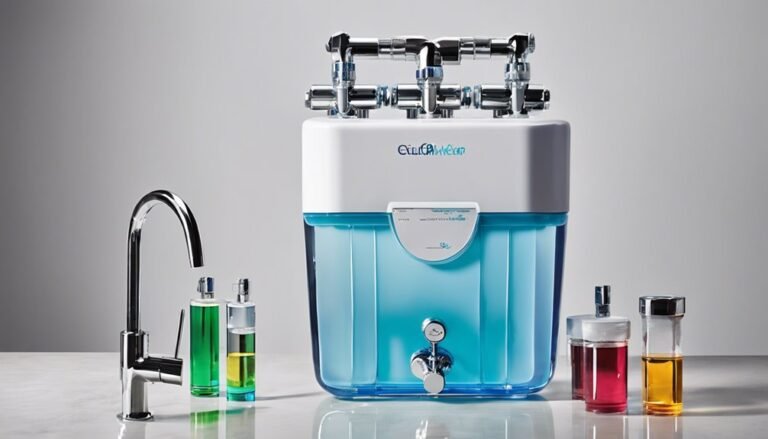What Is Ideal Softness for Water Softner?
Did you know that the softness of your water can greatly impact everything from your laundry to your skin? You might be surprised to learn that the ideal softness level for water softeners typically falls between 1 to 3 grains per gallon. This range not only enhances soap efficiency but also helps maintain your appliances. So, what factors should you consider when determining the perfect softness for your household? Understanding these aspects can lead to better water quality and energy savings.
Key Takeaways
- Ideal water softness for optimal performance is between 1 to 3 grains per gallon (gpg).
- Soft water enhances skin hydration, hair manageability, and overall cleaning efficiency.
- Reducing scale buildup extends appliance lifespan and improves energy efficiency, lowering utility bills.
- Regular testing of water hardness ensures proper settings for effective softening.
- Proper water softener settings prevent plumbing issues and enhance the effectiveness of soaps and detergents.
Understanding Water Hardness
Water hardness is an essential factor affecting your home's plumbing and appliances. It primarily results from the mineral composition of your water, specifically the presence of calcium and magnesium ions. When water flows through soil and rock, it dissolves these minerals, increasing its hardness.
You might notice that hard water can lead to scale build-up in pipes, water heaters, and other appliances, reducing their efficiency and lifespan.
To measure water hardness, you'll often encounter units like parts per million (ppm) or grains per gallon (gpg). Soft water typically has less than 60 ppm or 3.5 gpg, while hard water can exceed 180 ppm or 10.5 gpg.
Understanding your water's hardness is vital for determining the right water treatment solutions. If you're experiencing issues like soap scum or reduced appliance performance, you might be dealing with hard water.
Testing your water is the first step to understanding its hardness level. Many local water suppliers provide this information, or you can use at-home test kits.
Benefits of Soft Water
Soft water offers several advantages that can greatly impact your daily life.
You'll notice improved skin and hair health, as well as enhanced longevity for your appliances.
Plus, using soft water can lead to increased energy efficiency in your home, making it a practical choice for both comfort and savings.
Skin and Hair Benefits
Numerous studies indicate that soft water can greatly enhance the health and appearance of your skin and hair.
When you switch to soft water, you'll likely notice significant improvements in skin hydration and hair manageability. Hard water, laden with minerals, can lead to dryness and irritation, but soft water eliminates these issues.
Here are some key benefits you might experience:
- Increased skin hydration: Soft water helps maintain moisture levels, preventing dryness and flakiness.
- Softer skin texture: You may find your skin feels smoother and looks more radiant after washing with soft water.
- Improved hair manageability: Soft water can make your hair easier to style, reducing tangles and frizz.
- Less irritation: If you have sensitive skin, soft water can minimize redness and irritation caused by harsh minerals.
Appliance Longevity Improvement
Hard water can greatly shorten the lifespan of your household appliances, often leading to costly repairs or replacements. The minerals in hard water, such as calcium and magnesium, can accumulate inside your appliances over time, causing clogs and reducing efficiency. This buildup affects items like dishwashers, washing machines, and water heaters, making regular appliance maintenance essential.
Switching to soft water can markedly enhance appliance longevity. Soft water reduces mineral deposits, allowing your appliances to operate more smoothly and efficiently. For example, without the interference of hard water buildup, your dishwasher can clean dishes more effectively, and your washing machine can perform better, all while consuming less energy.
To further improve appliance longevity, consider some longevity tips. Regularly check and clean your appliances, following the manufacturer's recommendations.
Also, verify your water softener is properly maintained and adjusted to the ideal softness levels. By investing in soft water and adhering to these maintenance practices, you can extend the life of your appliances, saving you money in the long run while guaranteeing they work at their best.
Energy Efficiency Boost
A significant advantage of using a water softener is its ability to enhance energy efficiency in your home. Soft water reduces scale buildup in your appliances, allowing them to operate more efficiently. This means your water heater, dishwasher, and washing machine can run effectively, leading to significant energy savings.
Consider these benefits of soft water for energy efficiency:
- Lower energy bills: With appliances running more smoothly, you'll see a drop in your monthly energy costs.
- Improved appliance performance: Soft water helps your devices work better, prolonging their lifespan and reducing the need for replacements.
- Quicker heating times: Soft water heats up faster than hard water, meaning your water heater won't have to work as hard.
- Less detergent usage: You'll use less soap and detergent, which not only saves money but also reduces environmental impact.
Measuring Water Softness
Although many people overlook the importance of measuring water softness, it's an essential step in determining the effectiveness of a water softener. Accurate softness measurement allows you to understand the current hardness level of your water and evaluate how well your softener is performing.
There are several testing methods you can use to assess water softness. One common method is the use of test strips, which provide a quick and easy way to gauge hardness levels. Simply dip the strip into your water sample and compare the resulting color to the provided chart.
Another reliable option is a titration test, which involves adding a reagent to a measured volume of water until a color change occurs, indicating the hardness level.
For more precise results, consider using a digital water hardness tester. This device uses electrical conductivity to give you a direct reading of your water's hardness.
Regardless of the method you choose, it's vital to measure water softness regularly. This guarantees that your water softener operates effectively and that you're maintaining ideal water quality for your household needs.
Ideal Softness Levels
When it comes to water softness, achieving the right balance is essential for ideal performance and comfort in your home. The best softness levels typically fall within a softness range of 1 to 3 grains per gallon (gpg). This range effectively minimizes scale buildup while maximizing the benefits of softened water.
To help you understand the importance of ideal softness levels, consider the following:
- Enhanced cleaning power: Softened water improves the effectiveness of soaps and detergents.
- Longer-lasting appliances: Reducing scale buildup extends the life of your water-using appliances.
- Smoother skin: Soft water can prevent dryness and irritation, leaving your skin feeling soft and hydrated.
- Brighter laundry: Clothes washed in soft water tend to look cleaner and fresher.
Staying within this softness range allows you to enjoy these benefits without overdoing it, as excessively soft water can lead to slippery sensations and increased sodium levels.
Factors Affecting Softness
What factors play an essential role in determining water softness? The primary elements influencing softness are the concentration of hardness minerals, such as calcium and magnesium, within your water supply.
Softness measurement stems from the levels of these minerals: higher concentrations lead to harder water, while lower levels result in softer water.
Mineral balance is vital here. If your water contains an excess of hardness minerals, it can lead to scale buildup in pipes and appliances, reducing their efficiency.
Conversely, water that's too soft—often due to excessive sodium from water softeners—can corrode pipes and lead to metal leaching.
Local water sources also affect softness. For instance, groundwater often contains more minerals than surface water, impacting your water's initial hardness.
Moreover, seasonal changes can alter mineral levels, affecting the water's softness measurement throughout the year.
Understanding these factors helps you maintain ideal water softness, ensuring both your plumbing and personal care routines are effective while avoiding potential issues related to imbalanced mineral levels.
Adjusting Water Softener Settings
Adjusting your water softener settings is essential for achieving the ideal balance of softness in your water supply. Proper setting adjustments guarantee you're not only getting the right softness but also extending the life of your system.
Here's how to find the best settings for your needs:
- Prevents scale buildup in pipes and appliances, saving you costly repairs.
- Enhances the effectiveness of soaps and detergents, so you'll enjoy cleaner dishes and laundry.
- Improves skin and hair health, giving you that soft, luxurious feel.
- Reduces water waste, making your home more eco-friendly.
Start by checking your water hardness level using a test kit. This will help you understand how much adjustment is needed.
Next, refer to your water softener manual for specific guidance on setting adjustments. Generally, you'll want to set the hardness level based on the grains per gallon (GPG) of your water supply.
Finally, monitor your water quality regularly to guarantee your settings remain the best; you might need to make adjustments as water conditions change.
Common Myths About Soft Water
Many homeowners hold misconceptions about soft water that can lead to confusion and unnecessary concerns. One prevalent soft water misconception is that it's unhealthy for consumption. In reality, soft water is safe to drink, and the sodium levels introduced during the softening process are minimal.
Another common belief is that soft water doesn't clean as effectively as hard water. This hard water myth arises from the idea that minerals contribute to cleaning power. However, soft water actually enhances the effectiveness of soaps and detergents, allowing for better cleaning and less soap scum.
Some also think that soft water causes plumbing issues, fearing that it might corrode pipes. This isn't supported by evidence; in fact, soft water can reduce scale buildup, prolonging the life of your plumbing system.
Lastly, many think that installing a water softener is an unnecessary expense. While upfront costs exist, the long-term savings from reduced detergent use and less wear and tear on appliances often outweigh this initial investment.
Understanding these common myths can help you make informed decisions about your water treatment needs.
Troubleshooting Water Softening Issues
Water softening systems can sometimes encounter issues that disrupt their effectiveness, leading to frustration for homeowners.
If you're facing problems with your water softener, understanding the water quality in your home and utilizing effective troubleshooting techniques can help restore its performance.
Start by checking these common issues:
- Insufficient salt levels: Low salt can prevent proper resin regeneration.
- Clogged resin bed: Debris can hinder the softening process.
- Faulty valve: Mechanical issues can disrupt water flow.
- Incorrect settings: Verify your system is calibrated for your water quality.
Begin troubleshooting by evaluating the salt levels and inspecting the resin bed.
If you notice clogs or debris, it's crucial to clean the system.
A malfunctioning valve may require professional repair or replacement.
Finally, confirm that your settings align with your specific water quality needs, as improper configurations can lead to ineffective softening.
Frequently Asked Questions
Can Water Softeners Remove Contaminants From Drinking Water?
Water softeners primarily focus on improving water quality by removing hardness minerals. However, they aren't designed for contaminant removal; you'll need a filtration system to effectively eliminate harmful substances from your drinking water supply.
How Does Hard Water Affect Skin and Hair?
Think of hard water as sandpaper on your skin and hair; you'll notice skin irritation and hair damage over time. The minerals in hard water strip moisture, leaving your skin dry and hair brittle.
What Is the Difference Between Ion Exchange and Salt-Free Systems?
Ion exchange systems replace hard minerals with sodium, effectively softening water. In contrast, salt-free systems use a different approach, preventing scale buildup without altering mineral content. Each method has its advantages, depending on your needs.
How Often Should I Maintain My Water Softener?
You should perform water softener maintenance every 6 to 12 months. Establishing a maintenance schedule guarantees peak performance, preventing issues like salt buildup and inefficient operation, ultimately extending the life of your system.
Are There Any Health Risks Associated With Softened Water?
You should know that softened water can have some health implications, particularly for those on sodium-restricted diets. It's essential to monitor sodium levels in your water if you're concerned about potential health risks.
Conclusion
In conclusion, maintaining water softness between 1 to 3 grains per gallon is essential for maximizing the benefits of your water softener. For example, consider a family that switched from hard to soft water; they noticed a significant decrease in soap usage and a marked improvement in skin hydration. By regularly monitoring and adjusting your water softener settings, you can enjoy these advantages and prolong the lifespan of your home's plumbing and appliances.







